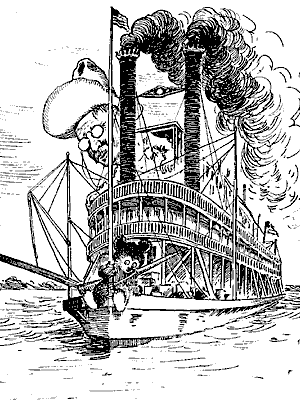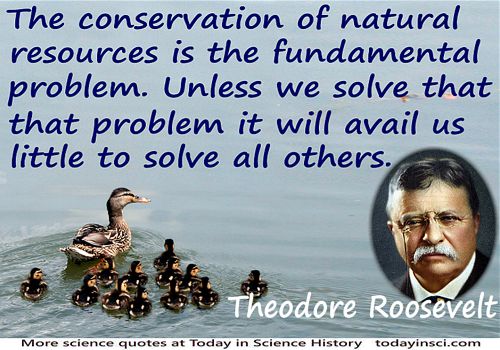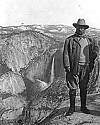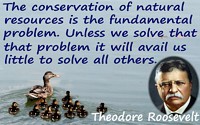 (source)
(source)
|
Theodore Roosevelt
(27 Oct 1858 - 6 Jan 1919)
American president and conservationist (26th, 1901-09) whose term included efforts to conserve national resources, especially the passage of the Newlands Reclamation Act (1902). He was the first president to ride in an automobile (1902), go underwater in a submarine (1905), or fly in an airplane (1910). Immediately after leaving his presidency, he undertook a safari to Africa as hunter and naturalist. In 1913, he travelled on a scientific expedition to the interior of Brazil which produced geographic, geological, and zoological information, and almost two thousand specimens of birds and mammals were collected for the American Museum of Natural Science.
|
Theodore Roosevelt - Conservation is Fundamental
Illustrated Quote - Medium Image (500 x 350 px)
More Theodore Roosevelt quotes on science >>

Detail from political cartoon by Clifford Berryman, 'Life on the Mississippi' (2 Oct 1907). (source)
The Context of “Conservation of natural resources is the fundamental problem” Quote

On 4 Oct 1907, Republican President Theodore Roosevelt addressed the Deep Water Convention being held at Memphis, Tennessee.1 It was one of his stops on a memorable three-week journey through a large part of the middle West and South that he began from Washington, D.C. on 29 Sep 1909. His purpose was to address the need for adequate improvement to the inland waterways from Chicago to the Gulf of Mexico.2
At Canton Ohio, on 30 Sep 1907, Roosevelt dedicated the McKinley National Memorial and honored the assassinated President. In his speech, Roosevelt also spoke at length against the kind of businessmen who made unscrupulous use of their wealth. To discourage dishonest businessment, it was to be the policy of the administration that wrongdoers would be vigorously prosecuted:3
When he reached Keokuk, he began a trip down the Mississippi River, after a speech that stressed the importance of the improvement of the navigable deep water route between Chicago and the Gulf. He repeated the theme when he spoke in St. Louis, explaining the “whys” for engaging in the project. He also made a short stop at Cairo as he continued down the river to Memphis.
While addressing the audience at the Deep Water Convention, Roosevelt declared, “In wealth of natural resources no kingdom of Europe can compare with the Mississippi Valley and the region around the Great Lakes,” which together with all the developing manufacturing centres brought an exceptional need for the transportation of “coal, lumber, corn, wheat, cotton, cattle.” The rivers, he said should be made “really fit to serve as arteries of trade.” To meet that cost, Roosevelt alleged:
“Is is computed that the annual value of the available but unused water power in the United States exceeds the anual value of all the products of all our mines … [and] under judicious handling the power of our streams may be made to pay for all the works required …”
Roosevelt then pointed out the value of forest to check soil erosion, retard run-off and prevent floods.
He expressed concern that “Many of these resources which we have been in the habit of calling inexhaustible are being rapidly exhausted, or incertain regions have actually disappeared. Coal mines, oil and gas fields, and iron mines in important numbers are already worked out. The coal and oil measures which remain are passing rapidly, or have actually passed, into the possession of great corporations, who acquire ominous power … without supervision of any kind.”
“Shall we continue the waste and destruction of our natural resources, or shall we conserve them? There is no other question of equal gravity now before the Nation. It is the plain duty of those of us who for the moment are responsible to make inventory of the natural resources which have been handed down to us, to forecast as well as we may the needs of the future, and so to handle the great sources of our prosperity as not to destroy in advance all hope for the prosperity of our descendents.”
“... the conservation of natural resources is the fundamental problem. Unless we solve that problem it will avail us little to solve all others. To solve it, the whole Nation must undertake the task through their organizations and associations, through the men whom they have made specially responsible for the welfare of the several States, and finally through Congress and the Executive. As a preliminary step, the Inland Waterways Commission has asked me to call a conference on the conservation of natural resources, including, of course, the streams, to meet in Washington during the coming winter. I shall accordingly call such conference. It ought to be among the most important gatherings in our history, for none have had a more vital question to consider.”
Before concluding, Roosevelt indicated that “The digging of the Panama Canal is the greatest engineering feat which has yet been attempted on this globe.” The benefit to come was that “When the canal is finished our navy can move from one ocean to the other at will; for, remember that our doors open on both oceans.”
2 Details of the trip from The American Marine Engineer (Oct 1907), Vol. 2, No. 10, 12.
3 In Addresses and Papers of Theodore Roosevelt (1909), 402.
- Science Quotes by Theodore Roosevelt.
- Theodore Roosevelt - memorialized as a Naturalist in a tribute by John Burroughs in Natural History magazine (1919)
- Theodore Roosevelt, Naturalist - memorial tribute by Henry Fairfield Osborn in Natural History magazine (1919)
- Theodore Roosevelt - Friend of Man - memorial tribute by Robert Peary in Natural History magazine (1919)
- Theodore Roosevelt and Africa - memorial tribute by Carl Akeley in Natural History magazine (1919)
- Personal Glimpses of Theodore Roosevelt - memorial tribute by David Starr Jordan in Natural History Magazine (1919).
- Roosevelt, the Man of Abundant Life - memorial tribute by Gifford Pinchot in Natural History magazine (1919).
- Theodore Roosevelt - context of his “A Country Without Trees” quote - Medium image (500 x 350 px).
- Theodore Roosevelt - context of his “A Country Without Trees” quote - Large image (800 x 600 px).
- Theodore Roosevelt - context of his “Conservation of natural resources is the fundamental problem” quote - Large image (800 x 600 px)
- The Wilderness Warrior: Theodore Roosevelt and the Crusade for America, by Douglas Brinkley. - book suggestion.
- Booklist for Theodore Roosevelt.








